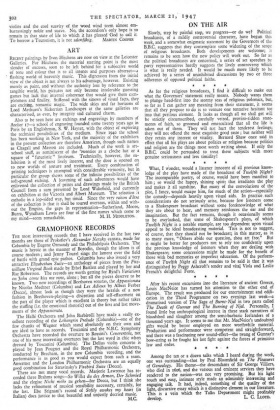ON THE AIR
Slowly, step by painful step, we progress—or do we? Political broadcasts, of a mildly controversial character, have begun this week, and a somewhat enigmatic statement by the Governors of the B.B.C. suggests that they contemplate some widening of the scope of religious broadcasts. Both developments are welcome; it remains to be seen how the new policy will work out. So far as the political broadcasts are concerned, a series of set speeches by party representatives hardly suggests the lively controversy which is what is really needed. It would be much more likely to be achieved by a series of uninhibited discussions by two or three adherents of opposed political faiths.
* * * * As for the religious broadcasts, I find it difficult to make out what the Governors' statement really means. Nobody wants them to plunge head-first into the stormy seas of religious polemics, but, so far as I can gather any meaning from their statement, it seems that all they propose to do is to venture one tentative hesitant toe into that perilous element. It looks as though all we shall get will be strictly circumscribed, carefully vetted, proviso-ridden state- ments of faith, so groomed and emasculated that all the life is taken out of them. They will not hurt the tenderest feelings; they will not offend the most exquisite good taste • but neither will they retain any interest or vitality. Bernard Shaw once said in effect that all his plays are about politics or religion because politics and religion are the things most worth writing about. If only the B.B.C. could be persuaded to treat these subjects with more genuine seriousness and less timidity!
* * * * What, I wonder, would a listener innocent of all previous know- ledge of the play have made of the broadcast of Twelfth Night? The incomparable poetry, of course, would have been manifest to him; so would the happy, shining spirit that irradiates the play and makes it all sunshine. But many of the convolutions of the plot, I fancy, would escape him, for much of the action—especially the comedy—depends heavily upon visual aids. In practice . such considerations do not seriously arise, because few listeners come to a Shakespeare broadcast without some foreknowledge of what they are about to hear, and memory reinforces the ear and the imagination. But the fact remains, though it occasionally seems to be overlooked, that some of Shakespeare's plays, of which Twelfth Night is a notable example, are too dependent upon visual appeal to be ideal broadcasting material. Tnis is not to suggest, of course, that they should not be broadcast; in this matter, as in so many more, " Others abide our question, thou art free." But it might be better for producers not to rely too confidently upon the previous knowledge of listeners when they ace dealing with Shakespeare; some concessions might be made for the benefit of those with bad memories or imperfect education. Of the perform- ance of Twelfth Night all that remains to be said is that it was distinguished by Peggy Ashcroft's tender and vital Viola and Leslie French's delightful Feste.
* * * * After his recent excursions into the literature of ancient Greece, Louis MacNeice has turned his attention to the other, end of Europe. The result was produced for our entertainment and edifi- cation in the Third Programme on two evenings last week—a dramatised version of The Saga of Burnt-Njal in two parts called The Death of Gunnar and The Burning of Njal. Personally, I found little but anthropological interest in these stark narratives of bloodshed and slaughter among the semi-barbaric Icelanders of a thousand years ago. It seems to me that Mr. MacNeice's undoubted gifts would be better employed on more worthwhile material. Production and performance were competent and straightforward, and there was a fascinating new sound-effect—tihe twang of Gtmnar's bow-string as he fought his last fight against the forces of primitive law and order. *• * * • *
Among the ten or a dozen talks which I heard during the week, one was outstanding—that by Paul -.Bloomfield on The Pleasures of Genealogy. His theme—the descendants of Sir George Villiers, who died in 1606, and the various and eminent services they have rendered to the nation—was not very promising. But his light touch and easy, intimate style made art admirably interesting and engaging talk. It had, indeed, something of the quality of the light, discursive essay which is a distinctive element in our literature. This is a vein which the Talks Department might profitably


































 Previous page
Previous page